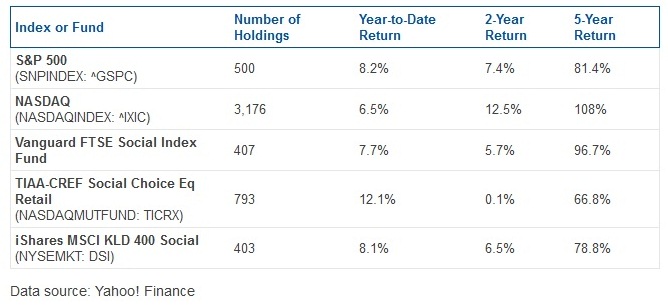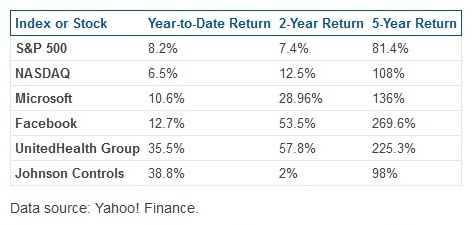There’s been a growing movement for investors to care not only about their own financial gain but also about the good of their community.
So-called “impact investors” are willing to put their money where their mouths are by investing in companies that also share their commitment to environmental, social, and governance causes, or other causes the investor cares about.
The movement often is called SRI, which stands for socially responsible investing.
Performance of socially responsible investing funds
There are many ways to practice socially responsible investing. You can avoid companies that engage in certain “sin” industries such as cigarettes or you can look for companies that support certain industries such as renewable energy. One way investors can participate in socially responsible investing without looking through the operations, employee-management policies, investments, supply chain, and other aspects of a company to decide if it’s meeting a set of criteria is to invest in an index fund specifically targeted at finding such companies.
For example, the Vanguard FTSE Social Index Fund (NASDAQMUTFUND: VFTSX) is made up of 407 stocks that the fund’s management says have been “screened for certain social, human rights, and environmental criteria.” Right on the front page of the fund’s summary, however, it notes that “one of the fund’s key risks is that this socially conscious approach may produce returns that diverge from those of the broad market.” Does socially responsible investing mean giving up potential gains? Here’s how some of the most popular socially responsible investing funds have held up against the market over year-to-date, two-year, and five-year time frames.
The best socially responsible investing stocks of 2016
While those indexes have had mixed performance against the broad market, some of the individual companies that make up these funds have done far better than the market while also staying true to their corporate social responsibility (CSR) values. The top holdings in each fund differ, but the same companies show up in many of them.
One company that pops up is Microsoft (NASDAQ: MSFT) , which ranked No. 2 in this year’s Reputation Institute list of companies considered the most responsible. Another company invested in by SRI funds is Johnson Controls International (NYSE: JCI) , which says it has been included in more than 40 sustainability indexes in recent years and touts its 41% reduction in greenhouse-gas emissions intensity from 2002 to 2014.
Other notable companies often included in SRI funds include Facebook (NASDAQ: FB) and UnitedHealth Group (NYSE: UNH) , each with its own commitments to employees and communities that earn it a spot in funds investing in socially responsible companies, and both of which are outperforming the market this year. Looking at the year-to-date returns of these four stocks, it’s easy to see why these were some of the best socially responsible stocks of 2016.
You can expect impact investing, and its impact on the market, to grow in the future. Research from U.S. Trust, Bank of America Private Wealth Management, shows that between 2014 and 2016, there was a 40% rise among millennial investors with impact investment holdings, and a 93% rise, to 27%, among those with $10 million or more in assets who said they invested this way.
Of course, picking companies based on their socially responsible credentials can be tricky. It’s not as easy as picking companies based on something simple like a price-to-earnings metric. Volkswagen (NASDAQOTH: VLKAY) , for instance, helda spot in some of these funds before its recent emissions scandal came to light, crushing the company’s reputation, as well as its stock price. However, there do seem to be plenty of companies that have made acting in a socially responsible manner a core tenet of their operations, while still posting impressive returns.
This article was taken from here.



